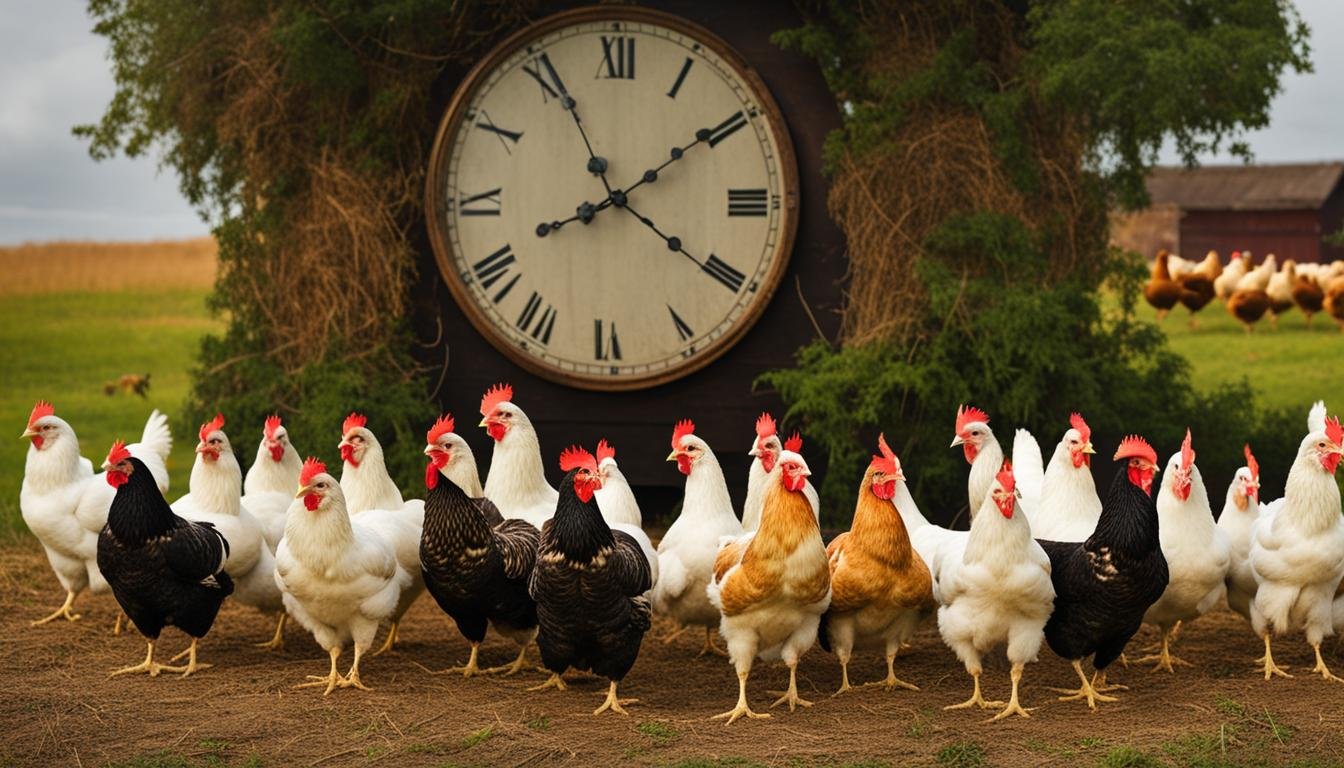How Long Do Chicken Live?
Chickens have been a popular addition to farms and backyards for many years. Not only are they a fantastic source of fresh eggs and meat, but they also make great pets for those interested in animal husbandry. However, how long do chicken live? That’s what we will explore in this article.
Knowing the expected life span of your chickens is vital in terms of providing the appropriate care, keeping them healthy, and ensuring that you get the most out of your investment. So, let’s dive into the topic and discover how long chickens typically live, what factors influence their lifespan, and how we can ensure they live long, happy lives.
Key Takeaways
- Understanding the lifespan of chickens is essential to provide them with optimal care.
- Factors such as breed, diet, housing, and healthcare practices can affect their longevity.
- Chickens have varying life expectancies depending on their breed.
- Recognizing signs of aging and promoting longevity through proper nutrition, environment, and flock management can extend their lifespan.
- Common diseases and health issues can impact the lifespan of chickens, so stay vigilant and take preventive measures.
Chicken Quiz
How well do you know chickens? Test your knowledge below!

Understanding the Life Expectancy of Chickens

If you’re considering keeping chickens, it’s important to have a good understanding of their average lifespan. Factors such as breed, diet, housing conditions, and overall health can all play a role in determining how long your chickens live.
| Breed | Average Lifespan |
|---|---|
| Rhode Island Red | 5-8 years |
| Leghorn | 4-7 years |
| Plymouth Rock | 6-8 years |
The average lifespan of chickens is typically around 5 to 10 years, with some breeds living shorter or longer depending upon their unique characteristics.
In addition to breed, diet can also have an impact on how long your chickens live. A nutritionally balanced diet that contains appropriate levels of protein, minerals, and vitamins is essential for overall health and longevity. On the other hand, a diet that is lacking in essential nutrients can lead to a shorter lifespan.
The living conditions of your chickens can also play a role in their life expectancy. Providing a safe and comfortable environment protects chickens from stress, disease, and harm, while also promoting their overall well-being.
Regular health checks, appropriate flock management practices, and quick intervention in the event of any signs of illness or disease can also help to extend the life of your chickens.
If you are considering getting chickens as pets or for egg production, it’s important to keep in mind that their lifespan is something that needs to be carefully considered and managed to ensure the best possible outcome for both you and your birds.
How Long Do Chicken Live: Factors Affecting Chicken Longevity

Several factors significantly impact the lifespan of chickens. By understanding these factors, you can create an environment that promotes the health and well-being of your feathered friends.
- Genetics: The genetics of a chicken plays a significant role in determining its lifespan. Chickens from breeds specifically designed for meat production tend to have a shorter lifespan than chickens from breeds used for egg production.
- Diet and nutrition: The diet and nutrition of chickens affect their overall health and lifespan. A balanced diet rich in essential nutrients, vitamins, and minerals can help improve their immunity and reduce the risk of diseases.
- Environmental conditions: Chickens thrive in comfortable living conditions. Hot or cold temperatures, overcrowding, poor sanitation, and inadequate space can lead to stress, disease, and lower life expectancy.
- Healthcare practices: Appropriate healthcare practices are critical to enhancing chicken longevity. Regular checkups, vaccinations, and disease prevention measures are essential to maintain optimal health and prevent the spread of illnesses.
- Effects of predators: Predators such as foxes, raccoons, and hawks can reduce the lifespan of chickens and even lead to their untimely death. Implementing adequate safety measures such as fencing, burrowing barriers, and providing shelter, can help protect your chickens and prevent predation incidents.
It’s essential to monitor and care for chickens throughout their lifespan, and knowing these factors is critical to ensuring optimal health and longevity.
Breed-Specific Lifespan Differences

It is essential to understand that different chicken breeds have varying lifespans that depend on a combination of factors such as genetics, environment, and overall care. Here are some chicken lifespan facts comparing popular breeds:
| Breed | Average Lifespan |
|---|---|
| Rhode Island Red | 6-8 years |
| Leghorn | 4-6 years |
| Orpington | 8-10 years |
| Sussex | 6-8 years |
| Silkie Bantam | 5-7 years |
| Plymouth Rock | 6-8 years |
As you can see, some breeds tend to live longer than others. However, it is important to note that these are just averages, and individual chickens may live longer or shorter than the average lifespan of their breed.
In conclusion, understanding the lifespan of different chicken breeds can help you plan better for their care and ensure they live the longest, healthiest lives possible.
Signs of Aging in Chickens

As chickens age, there are several signs that you can look out for to determine their age and overall health.
Physical Changes
One of the most noticeable signs of aging in chickens is changes in physical appearance. As they age, chickens may develop a grayer or paler comb and wattles, and their legs may become rougher and less vibrant in color. Additionally, their feathers may lose some of their luster, becoming duller and frayed.
Egg Production
The egg production of hens typically decreases with age. Young hens can lay up to six eggs per week, while older hens may only lay one or two eggs per week. If a hen stops laying eggs altogether, it is a sign that she may be reaching the end of her natural lifespan.
Behavioral Changes
As chickens age, they may also exhibit changes in behavior. For example, they may become less active and spend more time resting or sleeping. They may also become less vocal and less social, preferring to spend time alone rather than socializing with other members of their flock.
Health Issues
Finally, aging chickens are more prone to health issues such as arthritis, heart disease, and respiratory infections. If you notice any signs of illness or discomfort in your aging chickens, seek veterinary care promptly to ensure they receive appropriate treatment.
Promoting Longevity in Chickens
Providing appropriate care for your chickens is essential to promoting longevity. In this section, we will outline some practical tips and advice for ensuring your flock lives a long and healthy life.
Diet and Nutrition
A balanced and nutritious diet is key to promoting the longevity of chickens
Ensure your chickens have access to clean water at all times, as dehydration can lead to health issues. A diet consisting of high-quality commercial feed and fresh fruits and vegetables can provide the necessary nutrients for optimal health. Foraging and supplementing with seeds and grains can also be beneficial for their diet.
Safe and Comfortable Living Environment
A comfortable and safe living environment is crucial for promoting longevity in chickens
Ensure their coop is spacious enough and well-ventilated, with nesting boxes that provide a comfortable place for them to lay eggs. Proper insulation and protection from predators can prevent stress and illness. Regular cleaning and maintenance can also prevent the spread of disease.
Health Checks and Flock Management
Regular health checks and appropriate flock management practices can contribute to the longevity of chickens
Monitor your flock for any signs of illness or injury, and seek veterinary care as needed. Administer vaccinations and preventative treatments to protect against common diseases. Maintaining an appropriate flock size can also prevent overcrowding and stress.
Regular Exercise
Regular exercise and fresh air can benefit the health and well-being of chickens
Allow your chickens to exercise and forage outside of their coop, weather permitting. This provides not only exercise but also mental stimulation. Adequate space and opportunities for exercise can prevent obesity and other health issues.
“The key to promoting the longevity of chickens is to create an environment that fosters their overall health and well-being. By providing a balanced diet, safe living conditions, regular health checks and exercise, you can ensure your flock is living a long and healthy life.”
Common Diseases and Health Issues
The health of chickens is an essential factor in their longevity. Keeping chickens healthy can prevent the common diseases that plague them and contribute to their shortened lifespan.
The risks of diseases and health issues can vary depending on factors such as breed, housing conditions, and location. For example, chickens that are confined in small spaces have an increased risk of respiratory infections. The following are some common diseases and health issues that can impact the lifespan of chickens:
- Marek’s disease: A viral disease that attacks chickens’ nervous system, causing paralysis. Symptoms include difficulty walking and standing, and it can lead to death. The disease is highly contagious and can be transmitted through bird-to-bird contact or contact with contaminated surfaces.
- Fowlpox: A viral disease that can affect chickens of all ages. Symptoms include the development of wart-like lesions on the skin or upper respiratory tract, which can grow to obstruct the chicken’s airways and cause death by suffocation.
- Coccidiosis: A parasitic disease that can cause diarrhea, weight loss, and decreased egg production. Chickens can pick up the disease from contaminated feed or water. Good hygiene and sanitation practices can help prevent the disease’s spread.
- Avian influenza (bird flu): A contagious viral disease that affects various bird species, including chickens. Symptoms include coughing, sneezing, and the loss of appetite. The disease can be transmitted through direct contact with infected birds or contact with contaminated surfaces.
Preventive measures are crucial to managing the health of chickens. It’s essential to provide them with proper nutrition and clean, safe living conditions. Detecting symptoms of illnesses early on is critical to providing appropriate treatment and avoiding the spread of disease.
Regular health checks for your flock can help detect any potential issues before they become problematic. Isolating sick birds and maintaining good hygiene and sanitation practices can help prevent diseases’ spread.
Conclusion: Chickens Lifespan
As we conclude our exploration of the lifespan of chickens, it’s clear that these birds have a lot to offer. Whether you’re raising chickens for meat, eggs, or simply as pets, understanding and managing their lifespan is essential for ensuring their overall well-being and longevity.
By following the tips and advice we’ve shared throughout this guide, you can create a safe and comfortable living environment for your chickens, provide them with a balanced and nutritious diet, and ensure they receive regular healthcare and flock management.
Remember, caring for chickens is a lifelong journey and requires time, patience, and dedication. However, the rewards are well worth the effort, as these birds can provide endless joy, companionship, and sustenance. So, whether you’re a seasoned chicken keeper or just starting on this exciting adventure, know that you have the knowledge and skills to provide your flock with the best possible care and a long and healthy life.







